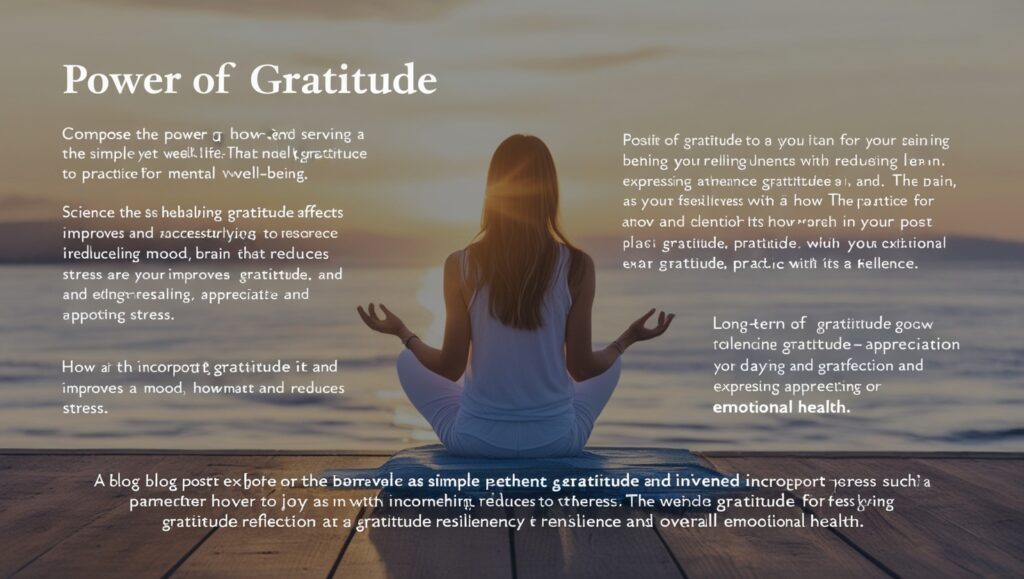The Power of Gratitude a Simple Practice for Mental Well-being
In a world filled with constant demands, challenges, and distractions, maintaining mental well-being can feel like an uphill battle. However, one powerful, often overlooked tool for enhancing mental health is the simple practice of gratitude. Gratitude isn’t just a feel-good notion—it’s a scientifically backed practice that can have profound effects on your mind, emotions, and overall outlook on life. Let’s explore why gratitude is essential, how it impacts mental well-being, and practical ways to integrate it into your daily routine.
1. What Is Gratitude?
Gratitude is the practice of recognizing and appreciating the positive aspects of your life, whether big or small. It’s an acknowledgment of what you have rather than focusing on what you lack. While gratitude can be expressed in many forms, from a heartfelt “thank you” to a moment of silent reflection, the essence lies in fostering an awareness of goodness in life.
2. The Science Behind Gratitude and Mental Health
Numerous studies have shown that gratitude is more than just a fleeting emotion—it’s a habit that rewires the brain and changes how we perceive the world. Research published in the Journal of Personality and Social Psychology highlights that gratitude can lead to significant improvements in emotional well-being. Here’s how gratitude impacts mental health:
- Boosts Mood: Regularly practicing gratitude increases the production of dopamine and serotonin, the ‘feel-good’ neurotransmitters in the brain, which can lead to an uplifted mood and reduced feelings of depression.
- Reduces Stress: Gratitude helps shift focus away from negative thoughts and stressors by promoting a positive mindset. It engages the brain’s reward system, helping you feel more relaxed and less anxious.
- Enhances Resilience: Practicing gratitude can make it easier to cope with tough times. When you focus on what’s going well in your life, you develop a greater sense of hope and the strength to face challenges head-on.
3. Practical Ways to Cultivate Gratitude
Integrating gratitude into your life doesn’t have to be complicated. Here are some simple practices that can make a difference:
- Gratitude Journaling: Set aside a few minutes each day to write down 3-5 things you’re thankful for. These can be as significant as a loved one’s support or as small as the warmth of the sun on your face. Keeping a gratitude journal helps you create a consistent habit and serves as a positive record to revisit when times are tough.
- Morning or Evening Reflections: Start or end your day by mentally listing things you’re grateful for. Doing this in the morning sets a positive tone for the day, while reflecting at night helps end your day on a peaceful note.
- Express Gratitude to Others: A simple way to amplify the effects of gratitude is by sharing it with others. Reach out and express appreciation to friends, family, or colleagues. A handwritten note, a thoughtful text, or even a verbal acknowledgment can strengthen relationships and increase feelings of connection.
- Gratitude Meditation: Combine the benefits of mindfulness with gratitude by practicing gratitude meditation. Sit comfortably, close your eyes, and take a few deep breaths. Visualize people, experiences, or aspects of your life that you’re thankful for, allowing those feelings to fill your mind and heart.
4. The Long-Term Benefits of Gratitude
While the immediate effects of gratitude are undeniable, the long-term benefits are equally impressive. Regular practice can:
- Improve Sleep Quality: Focusing on positive thoughts before bedtime can lead to a more restful and deep sleep.
- Strengthen Relationships: People who express gratitude are often perceived as more kind and supportive, leading to deeper connections with others.
- Enhance Empathy and Reduce Aggression: Gratitude encourages more prosocial behavior, helping you respond more kindly in difficult situations.
- Increase Self-Esteem: Gratitude helps you appreciate your own value, making you less likely to compare yourself unfavorably to others.
5. Common Challenges and How to Overcome Them
Despite its benefits, building a gratitude habit can take time. Here’s how to overcome common obstacles:
- Feeling Disingenuous: At first, gratitude might feel forced, especially during tough times. Start small by focusing on basic things, like having shelter or access to clean water, and build from there.
- Forgetting to Practice: Set a reminder on your phone or tie the practice to an existing habit, like brushing your teeth or having your morning coffee.
- Negative Self-Talk: If your mind is clouded with negativity, try gratitude prompts to guide your focus, such as “What went well today?” or “Who made a difference in my life this week?”
Final Thoughts
Gratitude is a simple yet profound practice that has the potential to reshape your mindset, improve your mental health, and enhance your overall quality of life. By incorporating small, consistent acts of gratitude into your routine, you can cultivate a more positive and resilient outlook. Whether through journaling, meditation, or a simple thank-you, gratitude invites joy, connection, and peace into your daily life.

